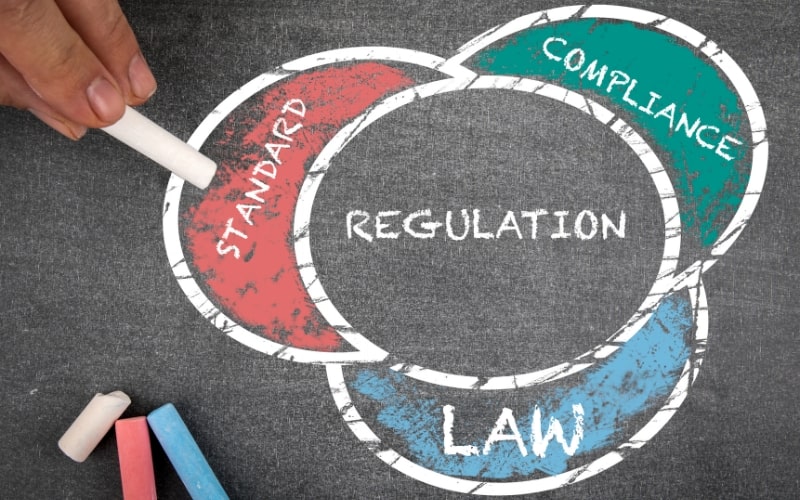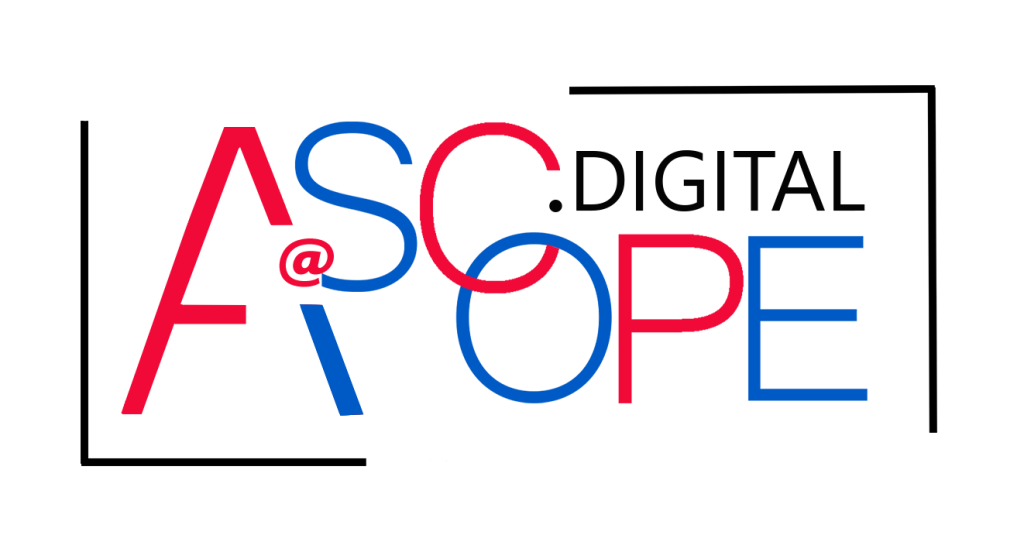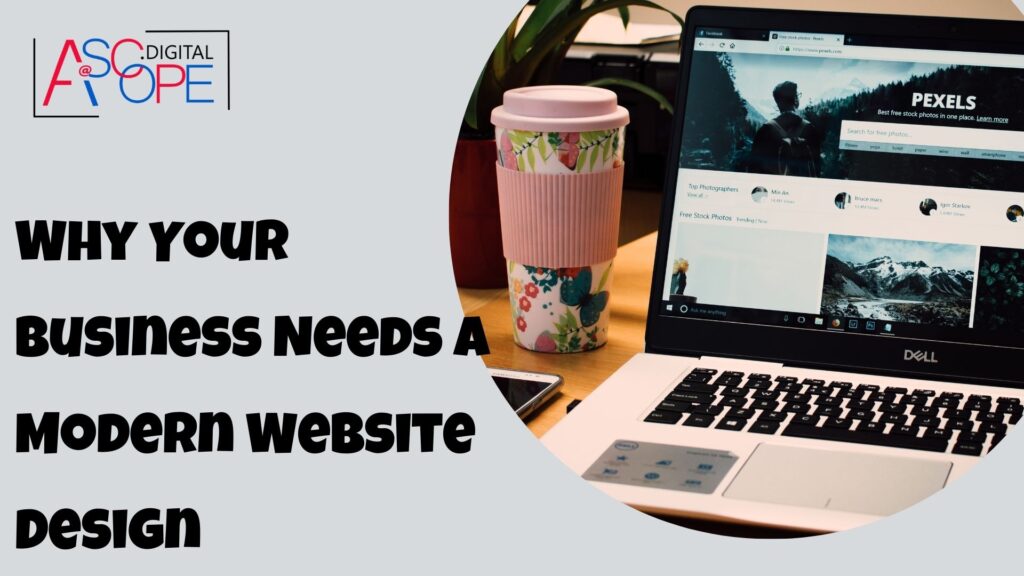In the rapidly evolving digital landscape, a modern website design is no longer a luxury but a necessity for any business striving to thrive and stay competitive. The digital presence of a business plays a crucial role in shaping its brand image, customer engagement, and overall success. This article delves into the compelling reasons why your business needs a modern website design and how it can significantly impact your growth and sustainability.
First Impressions Matter
Your website is often the first point of contact between your business and potential customers. Studies show that it takes only about 50 milliseconds for users to form an opinion about your website. A modern, aesthetically pleasing, and easy-to-navigate website creates a positive first impression, encouraging visitors to stay longer and explore your offerings.
A dated or poorly designed website, on the other hand, can drive visitors away, causing them to question the credibility and professionalism of your business. Ensuring your website has a contemporary design, with a clean layout and intuitive navigation, can significantly enhance user experience and build trust from the outset.
Improved User Experience
User experience (UX) is at the heart of modern website design. A well-designed website prioritizes user needs, providing a seamless and enjoyable browsing experience. This involves fast loading times, mobile responsiveness, easy navigation, and clear calls to action.
When visitors find it easy to navigate your website and access the information they need, they are more likely to stay longer, engage with your content, and convert into customers. Investing in modern UX design principles ensures your website meets the expectations of today’s discerning users, leading to higher satisfaction and better business outcomes.
Mobile Responsiveness
With the increasing use of smartphones and tablets, having a mobile-responsive website is crucial. Mobile internet usage has surpassed desktop, and search engines like Google prioritize mobile-friendly websites in their rankings.
A modern website design incorporates responsive design techniques, ensuring your website adapts seamlessly to various screen sizes and devices. This not only improves user experience but also boosts your search engine visibility, driving more organic traffic to your site.
Search Engine Optimization (SEO)
Search engine optimization is vital for improving your website’s visibility on search engines like Google. A modern website design adheres to SEO best practices, including fast loading times, mobile-friendliness, proper use of headings, clean code, and optimized images.
Additionally, modern websites often include features like SSL certificates for security, which Google considers in its ranking algorithms. By implementing these elements, you enhance your chances of ranking higher in search results, attracting more organic traffic, and ultimately increasing your business’s reach and potential customer base.
Brand Credibility and Trust

Your website is a reflection of your brand. A modern, professional design helps establish and reinforce your brand identity, making it more memorable and trustworthy to visitors. Consistency in design elements such as colors, fonts, and imagery across your website conveys a cohesive brand message.
A well-designed website also includes trust signals such as customer testimonials, case studies, certifications, and secure payment options. These elements reassure visitors about the legitimacy and reliability of your business, increasing their confidence in your products or services.
Competitive Advantage
In today’s competitive market, standing out is crucial. A modern website design can give you a significant edge over competitors with outdated or poorly designed websites. By showcasing your business as innovative and forward-thinking, you attract more attention and leave a lasting impression on potential customers.
A unique and engaging website design can also highlight your unique selling propositions (USPs) more effectively, differentiating your business from competitors and making it easier for customers to choose you over others.
Increased Conversion Rates
A modern website design is optimized for conversions. This involves strategically placing calls to action, creating compelling landing pages, and ensuring a smooth checkout process. When users find it easy to take desired actions, such as signing up for a newsletter, filling out a contact form, or making a purchase, conversion rates naturally increase.
Modern design techniques, such as A/B testing and heat mapping, allow you to continuously improve your website’s performance by analyzing user behavior and making data-driven decisions to enhance conversion rates further.
Scalability and Flexibility
As your business grows, your website needs to adapt and scale accordingly. A modern website design is built with scalability in mind, allowing for easy updates and expansions. This ensures your website can accommodate new products, services, or features without significant overhauls.
Modern content management systems (CMS) like WordPress, Joomla, or Drupal provide flexible frameworks that enable you to add, edit, or remove content with ease. This flexibility ensures your website remains up-to-date and aligned with your business goals.
Integration with Modern Technologies
A modern website design leverages the latest technologies and tools to enhance functionality and user experience. This includes integration with social media platforms, customer relationship management (CRM) systems, e-commerce solutions, and marketing automation tools.
These integrations streamline your business processes, improve customer engagement, and provide valuable insights into user behavior and preferences. By staying up-to-date with technological advancements, you ensure your website remains relevant and competitive.
Enhanced Security
With cyber threats becoming increasingly sophisticated, website security is paramount. Modern website designs incorporate robust security measures to protect your site and user data. This includes using HTTPS protocols, implementing regular security updates, and employing secure payment gateways.
A secure website not only protects your business from potential threats but also instills confidence in your customers, knowing their data is safe when interacting with your site. This trust is crucial for building long-term customer relationships and loyalty.
Better Analytics and Insights
Modern websites are equipped with advanced analytics tools that provide valuable insights into user behavior, traffic sources, and conversion rates. These insights help you understand how visitors interact with your website, allowing you to make informed decisions to improve performance and achieve your business goals.
Tools like Google Analytics, Hotjar, and Crazy Egg offer detailed reports and visualizations that enable you to track key metrics, identify areas for improvement, and optimize your website for better results.
Compliance with Legal and Regulatory Standards

A modern website design ensures compliance with legal and regulatory standards, such as the General Data Protection Regulation (GDPR) and the Americans with Disabilities Act (ADA). These regulations require websites to provide accessible and secure experiences for all users.
Compliance not only protects your business from potential legal issues but also demonstrates your commitment to inclusivity and user privacy. A modern website design incorporates features like cookie consent banners, privacy policies, and accessible design elements to meet these requirements.
Customer Engagement and Retention
Engaging and retaining customers is crucial for long-term business success. A modern website design includes interactive elements, such as live chat, forums, and personalized content, to enhance customer engagement and build stronger relationships.
By providing a platform for customers to interact with your brand and each other, you foster a sense of community and loyalty. Regularly updating your website with fresh content, such as blogs, videos, and case studies, also keeps visitors coming back for more, increasing retention rates.
Improved Social Media Integration
Social media is an integral part of modern marketing strategies. A modern website design seamlessly integrates social media sharing buttons, feeds, and login options to enhance user experience and drive traffic from social platforms.
These integrations make it easy for visitors to share your content, follow your social media profiles, and engage with your brand across multiple channels. This cross-platform presence amplifies your reach and strengthens your online presence.
Cost-Effective Marketing
A modern website design serves as a powerful marketing tool that can save you money on traditional advertising methods. By optimizing your website for search engines and leveraging content marketing strategies, you attract organic traffic and generate leads without the need for expensive ad campaigns.
Email marketing, social media marketing, and pay-per-click (PPC) advertising can all be integrated into your website, creating a cohesive and cost-effective marketing strategy. This holistic approach maximizes your return on investment (ROI) and ensures consistent brand messaging.
Showcasing Products and Services

A modern website design allows you to effectively showcase your products and services, highlighting their features, benefits, and unique selling points. High-quality images, detailed descriptions, and customer reviews provide potential customers with the information they need to make informed purchasing decisions.
Interactive elements, such as product videos, 360-degree views, and virtual tours, enhance the user experience and make your offerings more appealing. By presenting your products and services in the best possible light, you increase the likelihood of conversions and sales.
Staying Relevant in a Dynamic Market
The digital landscape is constantly evolving, with new trends, technologies, and user preferences emerging regularly. A modern website design ensures your business stays relevant and up-to-date with these changes.
By regularly updating your website with new features, content, and design elements, you demonstrate your commitment to innovation and adaptability. This proactive approach helps you stay ahead of competitors and meet the ever-changing needs of your customers.
Enhanced Customer Support
A modern website design incorporates features that enhance customer support, such as chatbots, FAQs, and contact forms. These tools provide instant assistance to visitors, answering their queries and resolving issues promptly.
Efficient customer support not only improves user experience but also builds trust and loyalty. By providing multiple channels for support, you ensure customers can reach out to you easily, leading to higher satisfaction and retention rates.
Environmental Impact
Sustainability is becoming increasingly important to consumers. A modern website design can contribute to your business’s environmental efforts by reducing paper usage and minimizing carbon footprint.
Digital processes, such as online billing, digital contracts, and virtual meetings, reduce the need for physical resources and travel, aligning your business with eco-friendly practices. This commitment to sustainability can also enhance your brand image and attract environmentally conscious customers.
Future-Proofing Your Business
Investing in a modern website design is an investment in the future of your business. As technology continues to advance, your website needs to be adaptable and scalable to meet new challenges and opportunities.
A modern design ensures your website is built on a robust and flexible foundation, capable of accommodating future updates, features, and integrations. This future-proofing approach prepares your business for long-term success in an ever-evolving digital landscape.
Staying Competitive in a Digital-First World
In today’s digital age, having a modern website design is not just a luxury but a necessity. Consumers expect businesses to have sleek, user-friendly websites that offer seamless navigation and a visually appealing experience. A well-designed website builds trust with potential customers, making them more likely to engage with your brand and make a purchase. Modern design elements, such as responsive layouts and fast loading times, enhance the user experience, keeping visitors on your site longer and reducing bounce rates. Integrating the latest SEO practices within your website design also boosts your search engine rankings, making it easier for customers to find you online. Thus, improving traffic and sales for your website. Read more on the other reasons why your website isn’t getting traffic. Investing in a modern website design ensures that your business remains relevant and competitive, meeting the expectations of today’s tech-savvy consumers
Conclusion
In today’s digital age, a modern website design is essential for any business looking to succeed and grow. From creating a positive first impression and improving user experience to boosting SEO and enhancing security, the benefits of a modern website are undeniable. By investing in a contemporary design, you position your business for success, staying competitive and relevant in a dynamic market. Don’t wait until your outdated website starts affecting your business negatively; embrace modern website design and unlock its full potential for your business’s growth and sustainability.


